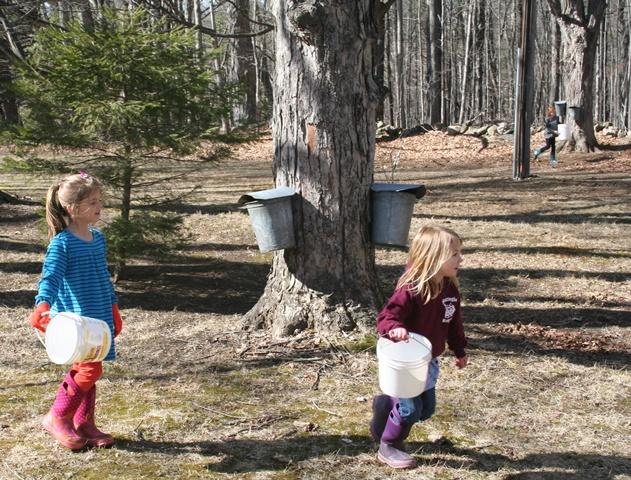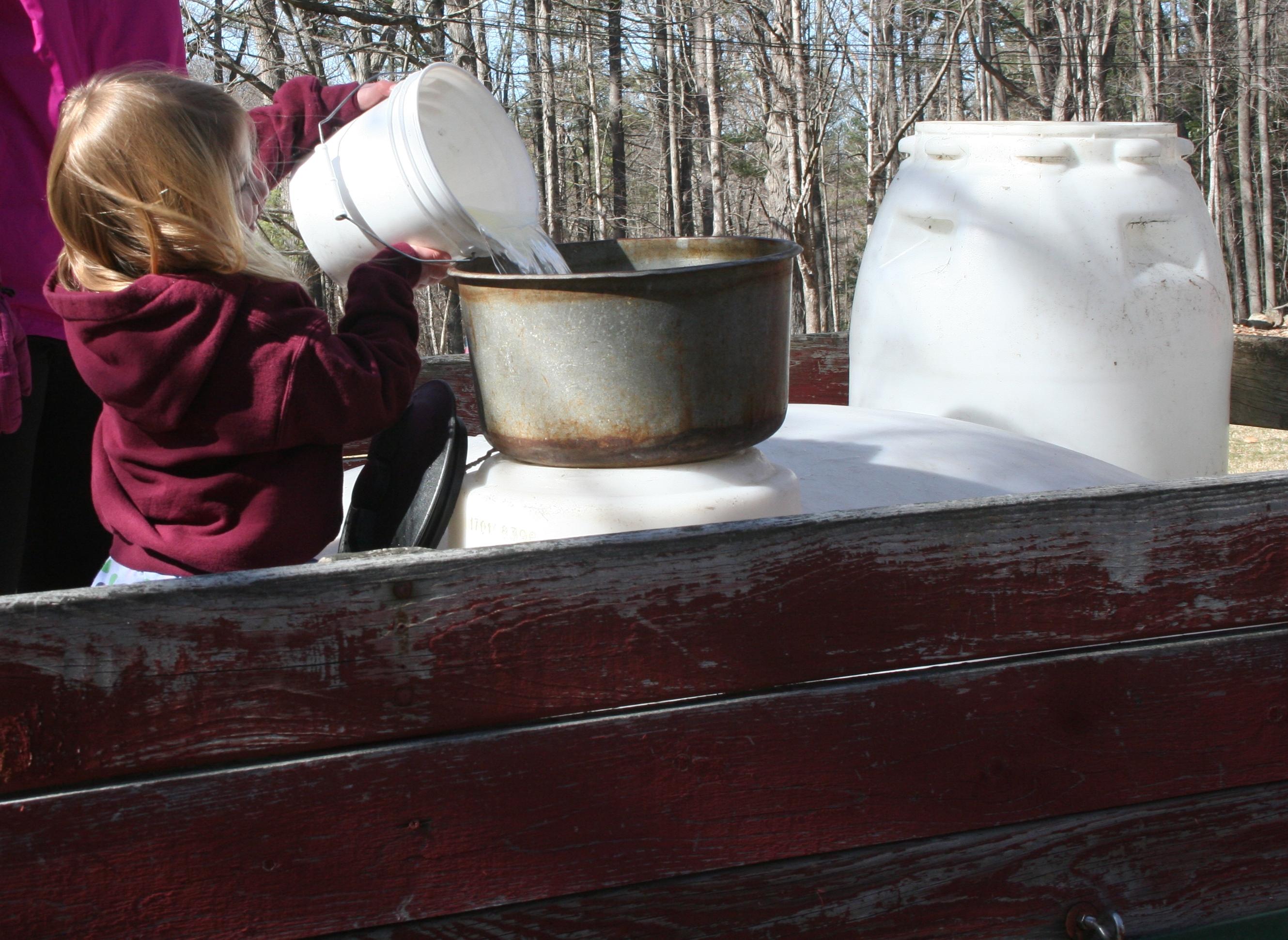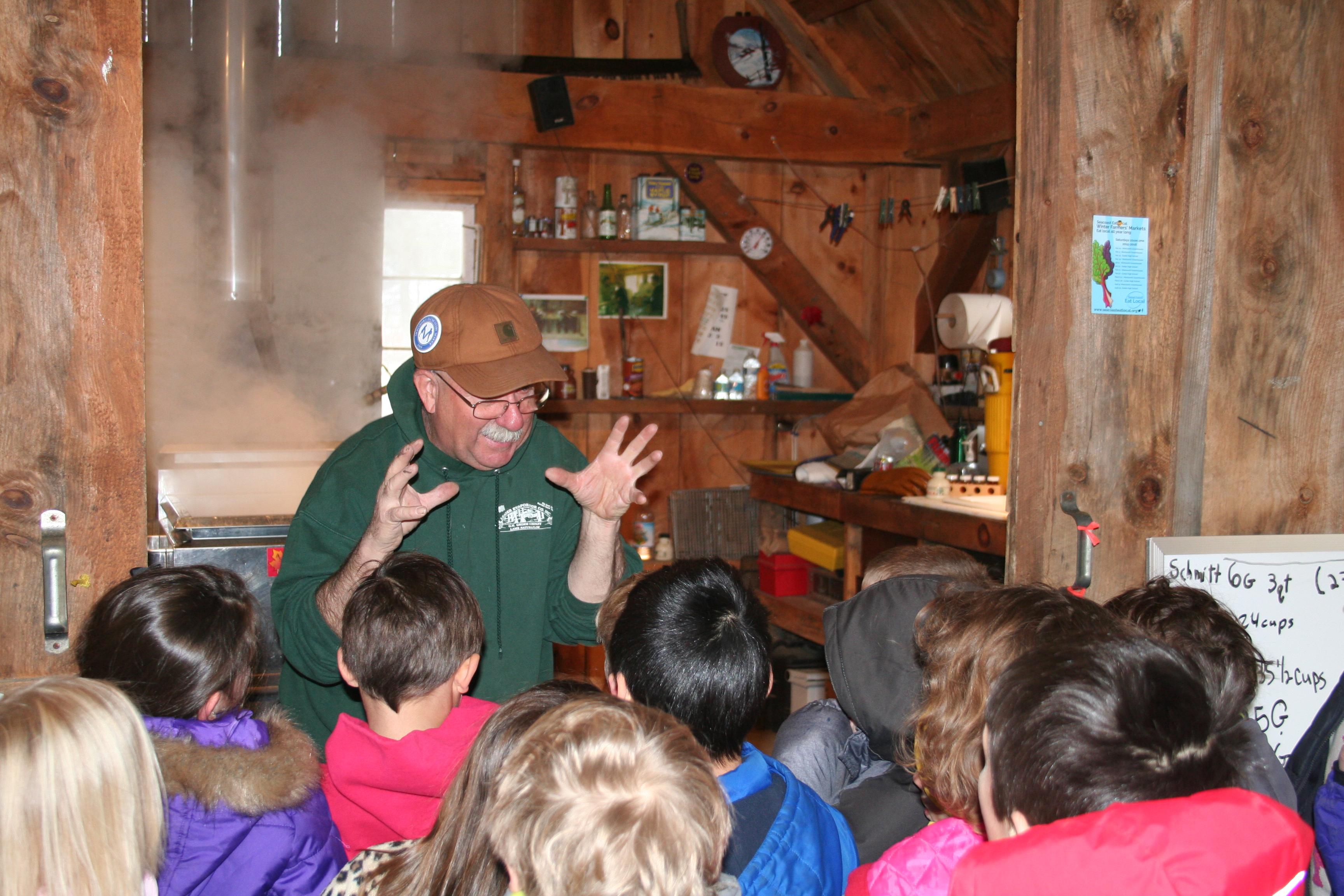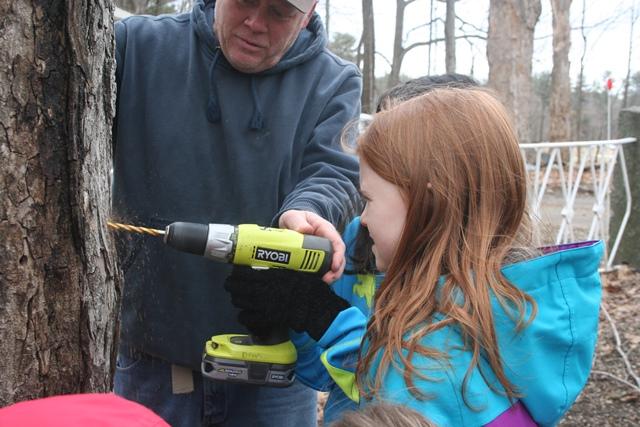Powder Major's Farm fuels school's maple syrup production
- Tags:
- Powder Major's Forest

“I just struck gold!”
“This one is really, REALLY full!”
“Ready? Let’s run, okay?”
The day is amazingly warm for March, and kids shout exuberantly in the sunshine as they dart to a row of huge granddaddy maple trees to lift the lids of the silver pails hung on their trunks.

They lug and laugh, pour and splash. Some of the sap soaks into shoes; most of it makes it into the tubs. Parents and volunteers help as needed, encouraging and celebrating the haul.
Then volunteer Jim Davis, a jolly, mustached retired firefighter, drives the tractor and wagon down the road to the sugar house at Moharimet Elementary School, where students from kindergarten through grade four will get to help produce maple syrup for their community --somewhere between 50 and 75 gallons, depending on the sap run.

It started with just a couple of teachers in the early ‘90s tapping a maple tree and boiling off the sap to show their students how maple syrup is made. As the years passed, more teachers got involved, more volunteers stepped up and they tapped more trees and boiled more sap on a stove in the parking lot. By 2001, the community rallied with volunteers and donations to build a beautiful sugar shack on school grounds. Now each spring, it steams to life as sap is boiled in the big stainless steel evaporator and excited students walk over for lessons, tastings and to bring more buckets of sap throughout the sugaring season. Some sap comes from the school property while most of it comes from the Powder Major Farm nearby, where the owners, the Goss family, welcome them each spring.
After the last jug is filled, the community celebrates with a huge pancake breakfast that brings together some 900 people to enjoy the fruits of the labor presented by some very proud students.
While they’re having fun, the kids learn. A lot.
“This has become a major part of the curriculum of the school,” Davis said. “This is not a field trip; this is not something we do for a couple of weeks in the springtime. Every class is engaged at some level or another.”
Teachers use the sugarmaking program however their creativity leads, so some may do maple math with ratios (40 gallons of sap = 1 gallon of syrup) or graphing the amount of sap collected, while others may use it to teach evaporation and condensation, poetry, the life cycle of trees, the history of sugarmaking… the applications are endless.

“Having fun is not a Common Core standard, but it is one that should be in every school,” he said. “This makes the curriculum come alive and it’s (based on) the kids’ own environment where they’re living. It really is very special.”
Moharimet Elementary draws kids in kindergarten through grade four from Durham, Madbury and Lee. It’s part of the Oyster River Cooperative School District, which has made teaching environmental sustainability a district-wide initiative. Each school has a Green Team that coordinates programs for recycling, composting, energy conservation and many others.
Moharimet’s Green Team Leader Kristin Houle visits classrooms to support teachers and coordinates sugarmaking activities with a core group of volunteers. They teach the kids how to tap the trees and how the whole sugarmaking process works. One of the latest initiatives is to forego Styrofoam plates at the pancake breakfast in favor of more sustainable alternatives.
“We’re creating a culture of sustainability,” said Harrington, with the goal of helping kids develop an understanding of their environment and mutual respect for people and nature.
So basically they’re trying to produce sweet people and sweet syrup at the same time. Time spent in forests can yield both.
There is a form of economic recycling going on in the sugarmaking, too. The pancake breakfast is a fund raiser, and proceeds go back into the maple program. Though Davis said the operation will soon meet state regulations for the selling of maple syrup, for now the state Dept. of Agriculture has supported their tradition of making jugs of syrup available to parents and community members on a “donations suggested” basis. Those donations then go right back into the program so that it is self-sustaining.
An elementary school running its own sugarmaking operation is a unique feat. For the folks who have fostered its growth over the years, the benefits are clear and far reaching.
Harrington gives personal exit interviews to every fourth grader who graduates from the school, and he said that most of the students mention the maple syrup experience, spending time in the woods during the school day, and the culminating pancake breakfast.
Those memories, Davis said, are what will stick.
“It’s heartwarming to hear what they remember year to year,” he said, “which means you’ve left something there.”
Revolution-Era Farm is Part of Community Conservation Project
Though the sugarshack and a 27-acre forest are on Moharimet Elementary School property in Madbury, more than half of the students’ sap collecting actually happens on the adjoining farm. The farm’s owners, the Goss family, welcome the students each spring. The Goss farm is a Revolution-era farm with towering sugar maples lining the long driveway and growing in a sugarbush not far from the farmhouse.
The farm is already a community resource thanks to the Goss family’s generosity, but it may soon become much more so. The towns of Madbury, Lee and Durham (the farm extends into all three) are working with the Forest Society to conserve 195 acres of the farm’s forestlands by buying the land and creating a conservation area there for use as a community resource for hiking, hunting, horseback riding, cross-country skiing and other low-impact recreation.
The new conservation area would be called The Powder Major’s Farm and Forest, because the land once belonged to Maj. John Demeritt, a local Revolutionary War figure. He became known as the Powder Major after hiding gunpowder on his property and then taking it by oxcart to the Continental Army for use in the Battle of Bunker Hill. There’s another interesting historic tie-in here: The land was once the planting grounds for a Native American chief named Moharimet, for whom Moharimet Elementary is named.
The land is not only close to the elementary school but it is also just behind the playing fields managed by the Oyster River Youth Association. A 10-mile trail system already exists on the property, which hosts a quarter mile of the Oyster River, a drinking water source for Durham and UNH.
You can find out more about this conservation project at www.forestsociety.org.
